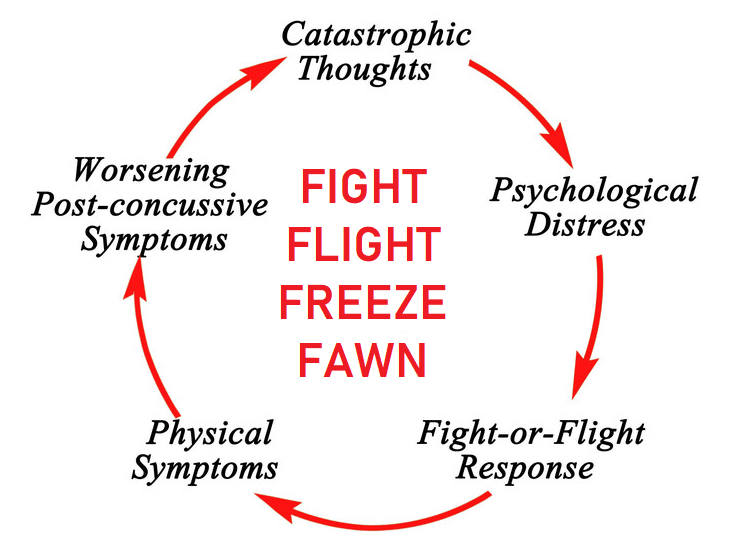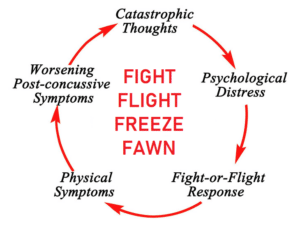Understanding and Managing the Fight, Flight, and Freeze Response can be difficult when you do not understand what, and why, your body reacts the way it does.
When confronted with intimidating or distressing situations, our bodies instinctively react in various ways. One such reaction is the “fight, flight, freeze” response, which is a natural mechanism designed to help us cope with threats. This article will delve deeper into this response, highlighting the significance of managing stress and anxiety effectively in order to remain composed and focused during challenging times.
The fight, flight, and freeze response is the body’s automatic reaction to perceived danger. It consists of three primary modes of action:
- Fight: In this mode, your body readies itself to confront the threat head-on. Physiological changes such as an increased heart rate and blood pressure take place. You may experience feelings of anger or aggression.
- Flight: In flight mode, your body prepares to escape the dangerous situation as quickly as possible. As with the fight response, your heart rate and blood pressure rise, a response to the fear or anxiety created by the event.
- Freeze: In contrast, the freeze response prompts your body to
 become motionless, effectively making you “play dead” in the face of a threat. During this state, your heart rate and blood pressure drop. You feel numb or disconnected from the situation. You can see ‘freeze’ in action if you watch a video of a lion chasing and catching another animal. Initially, the animal will become very still to put the lion off guard. Suddenly, it jumps, shocking the relaxed lion into letting go and it races off. Once clear of danger – the animal will ‘shake quite violently’ shaking off the trauma of the encounter. The step humans ‘forget to do!’
become motionless, effectively making you “play dead” in the face of a threat. During this state, your heart rate and blood pressure drop. You feel numb or disconnected from the situation. You can see ‘freeze’ in action if you watch a video of a lion chasing and catching another animal. Initially, the animal will become very still to put the lion off guard. Suddenly, it jumps, shocking the relaxed lion into letting go and it races off. Once clear of danger – the animal will ‘shake quite violently’ shaking off the trauma of the encounter. The step humans ‘forget to do!’
These three instinctual reactions are crucial in helping us survive hazardous circumstances. However, when they occur too frequently or are triggered by non-threatening situations, they lead to anxiety and chronic stress.
To maintain a sense of calm and focus during difficult situations, it is essential to learn how to effectively manage your fight, flight, and freeze response, particularly in the face of stress and anxiety.
Strategies
Below are some useful strategies to help you navigate these challenging moments:
Deep Breathing:
Practice deep, slow breaths to help regulate your heart rate and blood pressure. This can help you feel more relaxed and grounded in the present moment.
Positive Self-Talk:
Remind yourself that you are capable of handling the situation at hand. Positive affirmations can help to counteract feelings of fear or anxiety and foster a sense of self-confidence.
Seeking Support:
Reach out to friends, family, or a mental health professional to help you process your emotions and develop coping strategies. Sharing your thoughts and feelings can offer relief and foster a sense of connection during difficult times.
Mindfulness and Meditation:
Engage in mindfulness exercises or meditation to help you focus on the present moment and let go of negative thoughts or emotions.
Regular Exercise:
Physical activity can help reduce stress, improve mood, and increase resilience to challenging situations.
Adequate Sleep:
Ensure you get enough rest to allow your body and mind to recover and function optimally.
Natural Process
In summary, the fight, flight, and freeze response is a natural and essential part of our survival instincts. However, learning to manage it effectively in non-threatening situations is crucial for maintaining mental well-being and fostering resilience. By incorporating the strategies mentioned above, you can equip yourself with the tools necessary to navigate stressful situations with greater confidence and composure.
Book a Strategy Session
If you or anyone you care about is suffering from ongoing anxiety, stress, depression or post-traumatic stress, please book a complimentary session and learn how our Trauma Therapy can help you to step through to the other side of your pain. Everyone deserves to live a joyful life. You especially.


 become motionless, effectively making you “play dead” in the face of a threat. During this state, your heart rate and blood pressure drop. You feel numb or disconnected from the situation. You can see ‘freeze’ in action if you watch a video of a lion chasing and catching another animal. Initially, the animal will become very still to put the lion off guard. Suddenly, it jumps, shocking the relaxed lion into letting go and it races off. Once clear of danger – the animal will ‘shake quite violently’ shaking off the trauma of the encounter. The step humans ‘forget to do!’
become motionless, effectively making you “play dead” in the face of a threat. During this state, your heart rate and blood pressure drop. You feel numb or disconnected from the situation. You can see ‘freeze’ in action if you watch a video of a lion chasing and catching another animal. Initially, the animal will become very still to put the lion off guard. Suddenly, it jumps, shocking the relaxed lion into letting go and it races off. Once clear of danger – the animal will ‘shake quite violently’ shaking off the trauma of the encounter. The step humans ‘forget to do!’